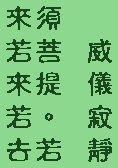CONTENTS
Commentary on Chapter 27 "Not
Cut Off and Not Extinguished"
 "Subhuti, you may have the thought that the Tathagata did
not attain Anuttarasamyaksambodhi by means of the perfection of marks.
Subhuti, do not think that the Tathagata did not attain
Anuttarasamyaksambodhi by means of the perfection of marks.
Subhuti, you should not think that those who have resolved their hearts
on Anuttarasamyaksambodhi affirm the annihilation of all dharmas.
Do not have that thought. And why? Those who have resolved their
hearts on Anuttarasamyaksambodhi do not affirm the annihilation of marks."
"Subhuti, you may have the thought that the Tathagata did
not attain Anuttarasamyaksambodhi by means of the perfection of marks.
Subhuti, do not think that the Tathagata did not attain
Anuttarasamyaksambodhi by means of the perfection of marks.
Subhuti, you should not think that those who have resolved their hearts
on Anuttarasamyaksambodhi affirm the annihilation of all dharmas.
Do not have that thought. And why? Those who have resolved their
hearts on Anuttarasamyaksambodhi do not affirm the annihilation of marks."
This chapter was spoken for those who, after hearing that one cannot contemplate the Tathagata by means of the thirty-two marks, might wonder how the Buddha attained Anuttarasamyaksambodhi. To think that the Tathagata did not use the perfection of all marks of blessings and virtue to attain the Unsurpassed, Proper and Equal, Right Enlightenment is incorrect. The Buddha admonished Subhuti to be careful not to think in that way. And why? If Anuttarasamyaksambodhi were the annihilation of marks, then that would mean that the Tathagata, although devoid of complete blessings, complete wisdom, and devoid of the perfection of marks, attained Anuttarasamyaksambodhi. To say that Anuttarasamyaksambodhi is the annihilation of all Dharmas is to fall into the extreme view of annihilationism. One who has resolved his heart on Anuttarasamyaksambodhi always affirms the ultimate meaning of the Middle Way. He does not assert the Dharma of annihilationism or the Dharma of permanence. The views of annihilationism and permanence are not the Buddha Dharma, and anyone not in accord with the Buddha Dharma cannot realize Buddhahood. So cultivators of the Buddha Dharma should understand the Middle Way, and not maintain extreme views.
Commentary on Chapter 28 "No Reception
and No Greed"
 "Subhuti, A Bodhisattva might fill world systems equal to Ganges River's
sands with the seven previous gems and give them as a gift. But if another
person were to know that all dharmas are devoid of self and accomplish,
patience, that Bodhisattva's merit and virtue would surpass that of
the previous Bodhisattva. And why? Subhuti, it is because
Bodhisattvas do not receive blessings and virtue."
"Subhuti, A Bodhisattva might fill world systems equal to Ganges River's
sands with the seven previous gems and give them as a gift. But if another
person were to know that all dharmas are devoid of self and accomplish,
patience, that Bodhisattva's merit and virtue would surpass that of
the previous Bodhisattva. And why? Subhuti, it is because
Bodhisattvas do not receive blessings and virtue."
But if another person were to know that all Dharmas are devoid of self... All Dharmas include all Buddha Dharmas. Concisely, they include the Four Noble Truths, the Twelve Causal Conditions, the Six Paramitas, the Six Roots, the Six Dusts, the Twelve Places, and the Eighteen Realms. If someone knows those various Dharmas are devoid of self, he does not attach to the marks of self or of things, for he knows that both persons and Dharmas are devoid of self. With no attachment to self and no attachment to Dharmas, the attachment to emptiness also disappears. At that time he accomplishes the Patience of the Non-production of Dharmas. In certifying to the Patience of the Non-production of Dharmas, one does not see the smallest Dharma produced or extinguished throughout the three realms. Although such patience can be experienced, it cannot be described.
 If we do not see even the smallest Dharma produced and do not see even the smallest
Dharma extinguished, does that mean there are no Dharmas? That is correct. Originally
there are no Dharmas. But no Dharmas still includes all Dharmas. Words cannot express
what is referred to by the Patience of the Non-production of Dharmas. The phrase, to
know that all Dharmas are devoid of self and accomplish patience is the most important
point made in the Diamond Sutra. Why does a Bodhisattva merely by knowing all
Dharmas have no self and by realizing patience, have more merit and virtue than the
Bodhisattva who gives vast amounts of wealth? It is because Bodhisattvas do not receive
blessings and virtue. In other words, Bodhisattvas do not attach to receiving blessings
and virtue. It is not necessary for acts which generate blessings and virtue done by a
Bodhisattva to have form or appearance. A Bodhisattva should not greedily become
attached and say, "I fostered these blessings. I did that virtuous deed." He should not
have such attachments. When a Bodhisattva is not attached to anything, what is there to
receive or not receive? Basically there is no reception or absence of reception. So the
Sutra says, "Bodhisattvas do not receive blessings".
If we do not see even the smallest Dharma produced and do not see even the smallest
Dharma extinguished, does that mean there are no Dharmas? That is correct. Originally
there are no Dharmas. But no Dharmas still includes all Dharmas. Words cannot express
what is referred to by the Patience of the Non-production of Dharmas. The phrase, to
know that all Dharmas are devoid of self and accomplish patience is the most important
point made in the Diamond Sutra. Why does a Bodhisattva merely by knowing all
Dharmas have no self and by realizing patience, have more merit and virtue than the
Bodhisattva who gives vast amounts of wealth? It is because Bodhisattvas do not receive
blessings and virtue. In other words, Bodhisattvas do not attach to receiving blessings
and virtue. It is not necessary for acts which generate blessings and virtue done by a
Bodhisattva to have form or appearance. A Bodhisattva should not greedily become
attached and say, "I fostered these blessings. I did that virtuous deed." He should not
have such attachments. When a Bodhisattva is not attached to anything, what is there to
receive or not receive? Basically there is no reception or absence of reception. So the
Sutra says, "Bodhisattvas do not receive blessings".
Commentary on Chapter 29 "The Stillness
of the Awesome Manner"
 "Subhuti, if someone were to say the Tathagata either comes
or goes, either sits or lies down, that person would not understand the meaning
of my teaching. And why? The Tathagata does not come from anywhere, nor does
he go anywhere. Therefore he is called the Tathagata."
"Subhuti, if someone were to say the Tathagata either comes
or goes, either sits or lies down, that person would not understand the meaning
of my teaching. And why? The Tathagata does not come from anywhere, nor does
he go anywhere. Therefore he is called the Tathagata."
In previous chapters, it has been said that there is no self, and no receiver of merit, but when the Tathagata was seen walking, standing, sitting or lying, was not this his self?
Again, it was due to the attachment to the false conception of the Three Bodies and the non-comprehension of universalized Dharma Body of the Buddha.
It seems as if the Tathagata comes and goes, but the coming and going is only illusory. Anyone who thinks he really comes or goes has failed to understand the teaching of the Buddha. The Tathagata has no place from which he comes and no place to which he goes; therefore he is called Tathagata, i.e. The Thus Come One. The Tathagata pervades all places.
 It is only the Buddha's Transformation Body that comes and goes, but his Dharma body does
not do so. Maitreya Bodhisattva spoke of a gatha:
It is only the Buddha's Transformation Body that comes and goes, but his Dharma body does
not do so. Maitreya Bodhisattva spoke of a gatha:
"What comes and goes are the Buddha's Transformation Bodies. The Tathagata is eternally unmoving. He is neither the same nor different from Every place within the Dharma realm."
It is not the Buddha who comes and goes, it is our mind that comes and goes. It is the discriminations of our Eighth Consciousness which perceives a coming and a going. For example,
When the water is pure, the moon appears.
When there are clouds, the moon is hidden.
When the moon appears in pure water, has the moon really come to the place?
When clouds hide the moon, has the moon really gone away?
In the mind of most people, there are so many discriminations that they entirely fill the field of the Eighth Consciousness (which is originally pure) with filth and defilements. When we no longer make discriminations, our wisdom can appear.
"Tatha" means non-movement and "gata" means movement. Movement and stillness are one identical suchness.